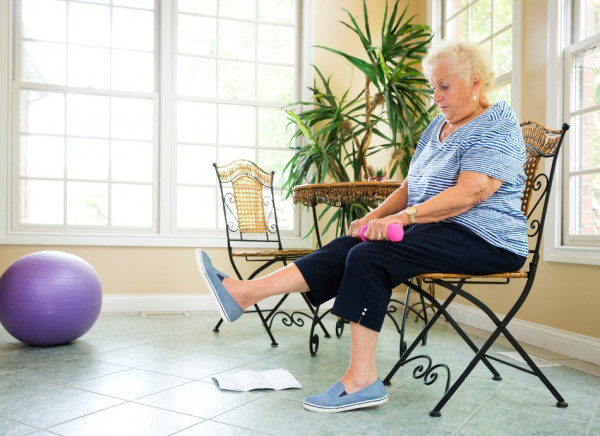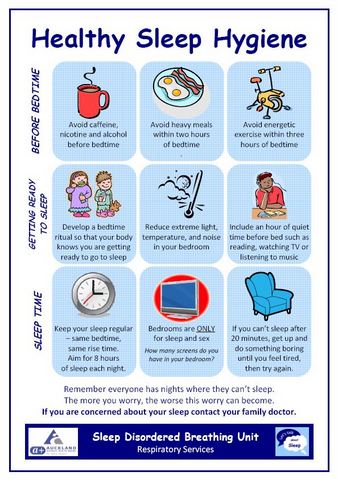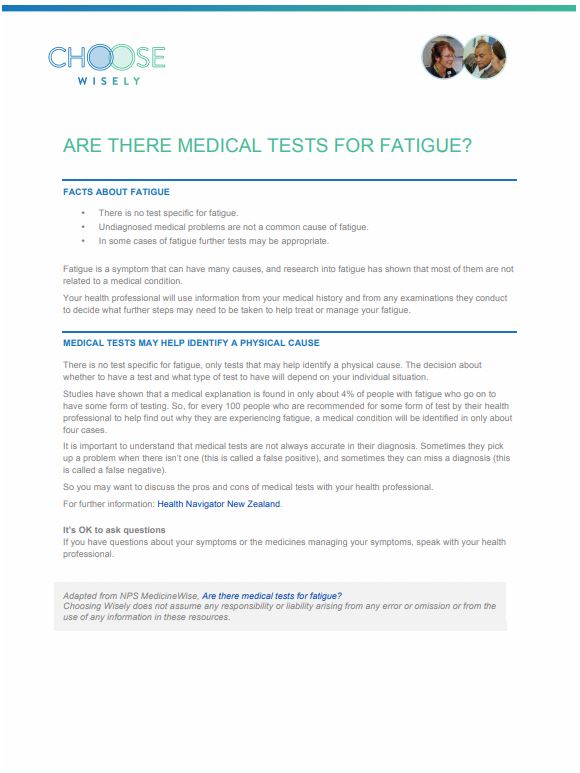Fatigue
Key points about fatigue
- Fatigue is the feeling of severe exhaustion or lack of energy, even after you've rested.
- Sometimes described as tiredness, fatigue is worse then being tired, which usually gets better after a few night of good sleep.
- Fatigue is common and can affect anyone – it's a symptom not a condition.
- Often fatigue is due to stress, poor sleep, poor diet and other lifestyle factors. eg, late nights, hard physical exercise or work, or having a new baby.
- If the fatigue doesn't go away (even if you get enough sleep, exercise and healthy food) or affects your ability to live your life, talk to your healthcare provider.

Fatigue is the feeling of exhaustion or lack of energy. It’s different from the feeling of sleepiness you get at bedtime, or tiredness after exercise or a late night. Fatigue affects most adults at some time – it can be due to physical illness, psychological causes or lifestyle factors.
Video: Fatigue, causes, signs and symptoms, diagnosis and treatment
Fatigue can cause a wide range of symptoms. These might include:
- feeling tired or sleepy all the time
- headache
- poor concentration
- slow reflexes
- blurry vision
- impaired judgement and difficulty making decisions
- feeling moody or irritable
- clumsiness or poor hand-eye coordination
- muscle pain
- feeling weak
- loss of appetite
- low motivation or general lack of interest
- seeing things that aren’t there (hallucinations).
Many different things can cause fatigue. These can be medical, lifestyle-related, workplace-related and/or emotional.
Medical causes of fatigue
Fatigue can be a symptom of many medical conditions including:
- flu
- COVID-19 and long COVID
- glandular fever
- myalgic encephalomyelitis/chronic fatigue syndrome (ME/CFS)
- coeliac disease
- heart disease
- diabetes
- thyroid disorders
- anaemia
- pregnancy
- going through menopause
- pain
- multiple sclerosis
- cancer or cancer treatment
- medication or a combination of medicines
- having a disturbed sleep pattern, eg, sleep apnoea, getting up in the night with an overactive bladder or prostate issue
Lifestyle causes of fatigue
Lifestyle causes can include:
- drinking too much alcohol or taking drugs
- poor sleep hygiene (external link)(eg, going to bed at irregular hours, too much noise or light)
- too much caffeine
- lack of exercise
- poor diet (eg, junk food)
Work related causes of fatigue
These could be:
- shift work (read more about sleep and shift work)
- poor workplace practices or environment (eg, long hours, hard physical labour, unsuitable environment)
- workplace stress, bullying, conflict or job insecurity
- unemployment.

Image credit: Canva
Emotional causes of fatigue
Emotional causes of fatigue are common. It’s not unusual to feel fatigued if you’re experiencing:
- anxiety
- grief or emotional shock
- stress
- depression.
The good news is there are practical things you can do to boost your energy levels and manage tiredness. However, if you have ongoing fatigue that isn’t improved with rest and sleep or is interfering with your life, talk to your healthcare provider. See ‘When should I see my healthcare provider?’ below.
Here are some tips that may help:
- Eat well – read more about healthy eating basics
- Get moving – read more about how physical activity can improve your life
- Lose weight to gain energy – read more about weight loss
- Manage stress – this page has some ways to reduce stress, including videos.
- Balance rest and activity.
- Cut out caffeine – learn more about the effects of caffeine.
- Cut back on or quit alcohol and/or drugs. Read more about alcohol, including alcohol and mental health, alcohol and harmful drinking and addiction.
- Drink more water – learn more about the benefits of water.
Talking to whānau or an understanding friend can often help if you’re experiencing fatigue or tiredness – they might offer support, eg looking after your tamariki, or picking up your groceries. You might also find it helpful to join a support group and talk with others who are experiencing fatigue.
Healthify's Te Kete Haerenga and fatigue toolkit has some advice and worksheets you may find helpful.
Apps reviewed by Healthify
You may find it useful to look at some Nutrition, exercise and weight management apps, Sleep and snoring apps, and Mental health and wellbeing apps.
Fatigue is a common symptom of COVID-19 infection. While you’re recovering, it can continue for weeks to months after the infection has cleared. Learn more about long COVID.
Helpful tips for managing COVID-related tiredness and fatigue
There’s no clear reason why some people feel more fatigued or tired than others. Different things contribute to the tiredness and make it last a long time. For example, a disturbed daily routine, poor sleep patterns, carer responsibilities, low mood, anxiety and stress can all make your fatigue worse.
While there's no one solution to fit everyone's needs, here are some general tips that you can use to manage fatigue.
Pace yourself and plan your activities
Pacing is an important strategy to help you to work within the limits of your fatigue. Overdoing it can make you feel more exhausted. You should develop an activity plan that is flexible depending on how you are feeling that day. Stay within your current ability, and slowly progress your activity levels as you feel able to do so.
Try to think about when you feel most fatigued; this might be in the afternoon or in the morning. Plan your tasks around your tiredness, and break up tasks throughout the week. For example, instead of cleaning the house in one day, do one room or part of that room each day. Take as many rest periods as you need throughout the day to recharge. If you're too tired to continue, that’s OK. Take a rest and try again tomorrow.
Prioritise your activities
Think about what activities are important to you. Focus on doing these, and consider asking somebody for help, or doing other tasks at a different time of the day.
Let others help you
It's OK to ask for help and allow others to help. Things like caring for children, shopping, preparing meals, or driving may be difficult. Accept offers of support and let people know what they can help you with. Services that can help with activities, such as shopping or cooking, may also be useful while you are still recovering.
Return to exercise slowly and safely
See returning to physical activity and exercise after COVID-19 for some tips on returning to exercise and improving your strength and fitness.

Image credit: Canva
If you have long COVID (lasting more than 12 weeks) the long COVID page has information about how to get support (link).
See your healthcare provider if you have fatigue plus any of the following symptoms:
- Weight change (loss or gain).
- Ongoing fevers.
- Heavy periods.
- Black tarry stools (poo) or blood in your stool.
- A change in bowel habits.
- Trouble staying awake during the day.
- Hair loss.
- Extreme thirst.
- Any other symptoms concerning you.
These may be signs of an underlying medical problem. Your healthcare provider might do tests (eg, blood tests, urine tests) and other investigations to check for signs of illness or disease.
Other healthcare professionals like a physiotherapist, mental health professional or occupational therapist might be able to help.
Myalgic encephalomyelitis/chronic fatigue syndrome (ME/CFS)
Low iron (iron deficiency)
Hypothyroidism | Mate repe tenga
Anxiety | Mate māharahara
Depression | Mate pāpouri
Alcohol and mental health
Common sleep problems
Sleep tips
Healthy eating basics
Stress | Mate māharahara
Stress at work
COVID-19: long COVID
Te Kete Haerenga and fatigue
Self-help tips to fight tiredness(external link) NHS, UK
Managing Long COVID(external link) Health New Zealand | Te Whatu Ora
Tiredness and fatigue(external link) Patient Info, UK
Brochures
Are there medical tests for fatigue?(external link) Choosing Wisely, NZ
Apps
Nutrition, exercise and weight management apps
Sleep and snoring apps
Mental health and wellbeing apps
References
- Tiredness(external link) Patient Info, UK, 2022
- Sleep and tiredness(external link) NHS, UK, 2023
- Fatigue(external link) Better Health Channel, Australia, 2023
- Fatigue(external link) HealthInfo Canterbury, NZ, 2022
- Fatigue(external link) Mayo Clinic, US, 2022
- Managing long COVID(external link) Health New Zealand | Te Whatu Ora
- Fatigue and TATT(external link) Patient Info Professional, UK, 2019
The following is from Fatigue and TATT(external link) Patient Info Professional, UK, 2019
Take a systematic approach, focusing on physical, psychological and social issues and lifestyle factors. Only a minority of patients presenting with fatigue will have a serious underlying physical cause. Red flags include:
- Significant weight loss or weight gain, especially if unexplained.
- Lymphadenopathy(external link) with signs of malignancy (eg, a lymph node that is non-tender, firm, hard, larger than 2 cm across, progressively enlarging, supraclavicular, or axillary).
- Any other symptoms and signs of malignancy (eg, haemoptysis(external link), dysphagia(external link), rectal bleeding(external link), breast lump(external link), postmenopausal bleeding(external link)).
- Focal neurological signs.
- Symptoms and signs of inflammatory arthritis(external link), vasculitis(external link)(eg, giant cell arteritis (external link)and polymyalgia rheumatica(external link)), or connective tissue disease(external link).
- Symptoms and signs of cardiorespiratory disease (eg, angina(external link), asthma(external link), chronic obstructive pulmonary disease(external link), heart failure(external link)).
- Sleep apnoea(external link).
Differential diagnoses
Consider:
- depression
- obesity
- obstructive sleep apnoea
- poor sleep pattern, hard work, stress
- treatment with a sedative, caffeine withdrawal
- myalgic encephalomyelitis/chronic fatigue syndrome (ME/CFS)
- any physical illness may be associated with fatigue, particularly anaemia, iron deficiency, cancer, renal disease, liver disease, heart failure, thyroid disease, diabetes, autoimmune disease.
Other resources
Daily iron supplementation for improving anaemia, iron status and health in menstruating women(external link) Cochrane Developmental, Psychosocial and Learning Problems Group, 2016. There is evidence that iron supplementation improves fatigue scores, particularly among women with baseline fatigue.
Apps
Nutrition, exercise and weight management apps
Sleep and snoring apps
Mental health and wellbeing apps
Brochures

Auckland DHB, NZ

Choosing Wisely, NZ, 2016
Credits: Healthify editorial team. Healthify is brought to you by Health Navigator Charitable Trust.
Reviewed by: Dr Art Nahill, Consultant General Physician and Clinical Educator.
Last reviewed:





